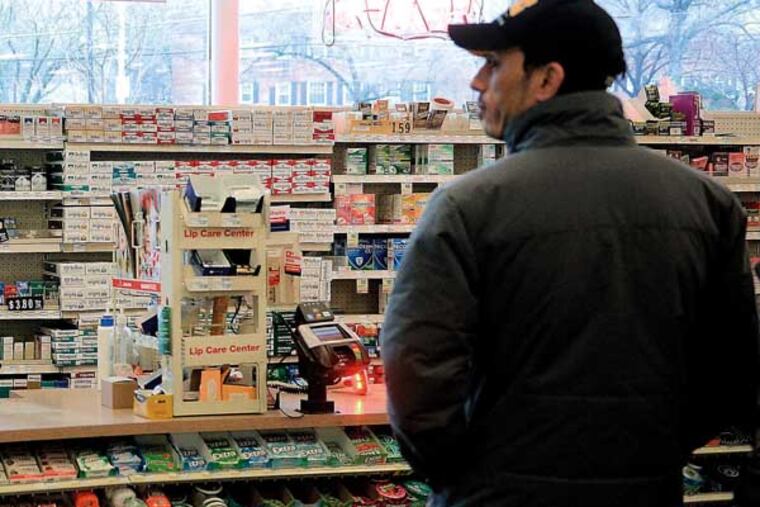Cheers to CVS for dropping tobacco
Few stores are as common and seemingly soulless as CVS. Even the name is beyond bland. Who can love a lump of letters?

Few stores are as common and seemingly soulless as CVS. Even the name is beyond bland. Who can love a lump of letters?
This quality is due in large part to the drugstore giant's numbing ubiquity, claiming every other corner. It's also because of what CVS has replaced, the beloved neighborhood merchant featuring a soda fountain and a pharmacist who knew your prescriptive needs.
Yet CVS and other drug-chain monoliths pervade our lives. I shop there more than I care to acknowledge. In many households, certainly mine, CVS is the most persistent caller to our forlorn land line.
So here I write words I never imagined I would: Bravo, CVS.
CVS Caremark, the nation's second-largest drugstore chain, with 7,600 locations (211 in the Philadelphia region), announced last week that it would stop selling cigarettes and tobacco products by October, resulting in a projected annual revenue loss of $2 billion.
Legal and lethal, tobacco contributes to more than 480,000 deaths a year in the United States. Smoking is deadly yet preventable. Like crime, smoking usually begins early or not at all: 68 percent of all smokers start before age 18, 85 percent before 21.
Like many retailers, CVS stocks cigarettes behind the counter, where they are easily visible to children and adults alike, just beyond and above the candy.
Quitting tobacco sales is "a pretty bold and interesting decision, to say the least," said David J. Reibstein, a professor of marketing at the University of Pennsylvania's Wharton School. "It's more of a political or positioning move than one that has direct economic positive consequences."
But CVS is increasingly Caremark, a health-care provider with a mammoth pharmacy benefits management business, and with in-store clinics that stand to benefit from the Affordable Care Act. It's hard to woo sick people while selling something that will make them so, or to promote antismoking products while supplying smokers.
Said CVS Caremark chief executive Larry J. Merlo, a pharmacist, "Put simply, the sale of tobacco products is inconsistent with our purpose." The company also plans to launch a "robust national smoking-cessation program."
'Commitment'
The decision should also strengthen the company's lucrative relationships with insurers, hospitals, and medical practices. Physicians were "a little bit suspicious of us because we sell cigarettes," CVS's chief medical officer, Troyen Brennan, told the Wall Street Journal. "This move gives us a competitive advantage because it shows our commitment to health care."
Brennan cowrote an article on the health-care advantages of ending tobacco sales that appeared in the Journal of the American Medical Association the day of his company's announcement, saying that "reducing the density of tobacco outlets probably reduces smoking among young people."
'Just huge'
Not that there hasn't been industry pressure. Since 2010, the American Pharmacists Association has criticized the hypocrisy of drugstores' promoting health while selling cigarettes.
CVS's decision "shows real corporate social responsibility," said Stanton Glantz of the Center for Tobacco Control Research and Education. "They're walking away from a bunch of money. It's very impressive. The symbolic value is just huge."
Glantz added that "the move puts gigantic pressure on Walgreens," the nation's largest drugstore chain. "If they don't do it, they look like a bunch of callous jerks."
Such corporate decisions are rare, but they do happen. The Eagles and Phillies banned smoking in their venues, Reibstein noted, and cut off beer sales toward the end of games. These may not be economically beneficial decisions, "but they are the right thing to do."
America is producing fewer smokers. Five decades ago, almost half of adults smoked, while today fewer than a fifth do. Hence the importance to tobacco companies of hooking new consumers when they're young. But we have more old people every day, a baby boom less booming and increasingly reliant on prescriptions and drugstore staples.
In the long term, quitting tobacco may prove to be smart business, reaping immediate goodwill from previously indifferent consumers like me. I shop at CVS because it's the nearest drugstore. But I like the chain a whole lot more than I did a week ago.